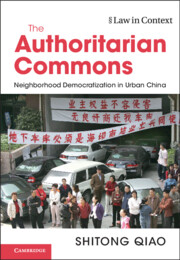Book contents
- The Authoritarian Commons
- Law in Context
- The Authoritarian Commons
- Copyright page
- Dedication
- Contents
- Figures
- Tables
- Acknowledgments
- Abbreviations
- Introduction
- Part I Theory
- Part II A Tale of Three Cities
- 3 The Three Styles of Authoritarianism
- 4 Rule of Law for Democracy
- 5 Property
- Part III Benefits and Risks
- Conclusion
- Appendix I: Summary of Research Methods
- Appendix II: Survey Data and Analysis
- Notes
- Bibliography
- Index
4 - Rule of Law for Democracy
from Part II - A Tale of Three Cities
Published online by Cambridge University Press: 21 December 2024
- The Authoritarian Commons
- Law in Context
- The Authoritarian Commons
- Copyright page
- Dedication
- Contents
- Figures
- Tables
- Acknowledgments
- Abbreviations
- Introduction
- Part I Theory
- Part II A Tale of Three Cities
- 3 The Three Styles of Authoritarianism
- 4 Rule of Law for Democracy
- 5 Property
- Part III Benefits and Risks
- Conclusion
- Appendix I: Summary of Research Methods
- Appendix II: Survey Data and Analysis
- Notes
- Bibliography
- Index
Summary
This chapter provides a legal explanation for the different homeowners’ association (“HoA”) rates in Shanghai (94 percent), Shenzhen (41 percent), and Beijing (12 percent). Despite China being a unified regime with national law that is supposed to apply across different parts of the country, the local rules applicable to HoA elections differ across the three cities. Beijing has consistently followed national law, whereas Shenzhen adopted its own legislative rules until the passage of the Civil Code in 2020, at which time local rules gave way to national law, and Shanghai has left the choice to individual neighborhoods, with its courts relying on the idea of autonomy in private law to justify local practices that contradict national law. Both the national rule adopted in Beijing and the city rule adopted in Shenzhen have imposed significant decision-making costs on the establishment of HoAs, as well as collective governance problems ranging from parking space allocation to building maintenance. By contrast, the Shanghai approach, that is, allowing homeowners to write their own voting rules into HoA constitutions to reduce decision-making costs and using the courts to safeguard procedures and minority interests, contributes to functioning neighborhood democracy in Shanghai.
Keywords
- Type
- Chapter
- Information
- The Authoritarian CommonsNeighborhood Democratization in Urban China, pp. 44 - 60Publisher: Cambridge University PressPrint publication year: 2025

